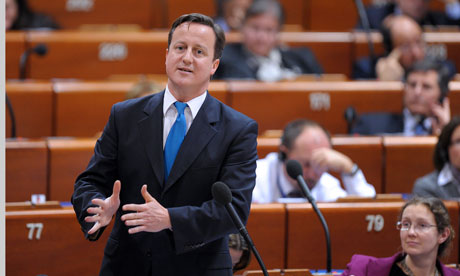Strasbourg is for all, Cameron warned
Senior Council of Europe official tells Guardian that UK's proposals for court reform could weaken ECtHR
David Cameron was questioned about his proposals for reforming the human rights court at a meeting immediately after his speech in Strasbourg with the senior official of the body that runs the court.
Thorbjørn Jagland, secretary general of the Council of Europe, told the Guardian that he had discussed the principle of subsidiarity with the prime minister.
Referring to this principle, Cameron had told the council's parliamentary assembly that the human rights court should not substitute its own judgment for that of "reasonable national processes".
The prime minister added that when an issue such as whether prisoners should be allowed to vote had been "subjected to proper, reasoned debate and has also met with detailed scrutiny by national courts in line with the [human rights] convention, the decision made at a national level should be treated with respect".
Jagland told the Guardian that it was very important to decide how subsidiarity should be defined.
"If you say that, in those countries that have applied the convention fully, the court should keep its hands off, this can be misused," he said. "It is very important to say that this court is for all."
In apparent disagreement with the UK's position, Jagland said it was for the court, not member states, to decide which countries had complied with the convention. Under the UK's proposals for limiting the number of cases brought before the court, an application would be declared inadmissible if it was "substantially the same" as a matter that had already been examined by a domestic court applying the human rights convention.
An exception would be made where the national court had "manifestly erred in its interpretation or application of the convention rights".
And there would be a further exception if the application raised a "serious question affecting interpretation or application of the convention".
Despite these exceptions, this change would lead to fewer adverse rulings for the UK. It appears that the secretary general is worried that it would also lead to fewer adverse rulings in cases brought against countries with more questionable records than the UK on human rights.
Under another UK proposal, there could be a "sunset clause" under which cases would be thrown out if they could not be decided within a time limit of one or two years.
But Jagland insisted that the right of individuals to take their case to the court should be safeguarded.
"Nothing should be done to undermine the right of individual petition," he said. Without that, the court would lose its power over member states.


No comments:
Post a Comment